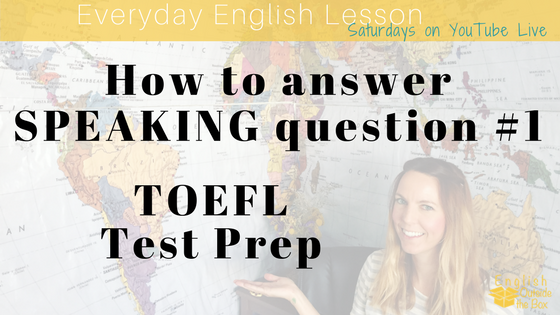
TOEFL Speaking: Question 1
I’ve been getting a lot of requests for more test preparation materials, especially to help students with the speaking section of the TOEFL. I’ve helped many students pass the TOEFL exam, reach their goals, get into universities, obtain new jobs, and overcome obstacles in this challenging test. Today I want to share information, tips, and strategies with you here about the first question in the speaking section.
Even if you’re not taking the exam, this lesson with help you with speaking skills and giving you some topics and skills to practice. So get ready to master the TOEFL speaking question 1, and improve more of your everyday English now:
TOEFL TEST PREP
How to Answer Speaking Question 1
Be prepared for the question
- STRUCTURE: In this question, you’ll have 15 seconds to prepare and 45 seconds to speak
- TOPIC: Question 1 (and 2) are independent tasks, because they ask about familiar topics that you can answer independently with your own ideas. There is no listening or reading involved. The topics you will speak about are people, places, things, events, or holidays that are familiar to you
Familiarize yourself with a wide range of vocabulary relevant to describing people, places, objects, events, and holidays that relate to you. This question will often ask about things in your country (events, people, holidays), so review some important cultural events from your city or country. Think about people who are important to you, family, friends, teachers, and/or famous figures. Be ready to talk about gifts you’ve received or objects are are important to you. Do you have a favorite place to visit, or somewhere you go to relax?
What will you be asked?
If you get comfortable with talking about a few broad or generalized topics, then these can be applied to several different questions types. For example, let’s talk about a familiar person in your life such as a teacher. How would you describe him or her? Why are they important in your life? If you’re comfortable describing this person, who they are, what they do, and why they’re important, then this answer can be applied to several types:
- Describe someone who is influential…
- Choose a teacher you admire and say why…
- Who in your life has helped you and what have they done…
- Choose a person who has impacted your life greatly…
- Who is someone you look up to…
- Who is the most intelligent/thoughtful/generous/inspiring person you know…
As you can see, reviewing 1 topic can potentially help you answer several question varieties. You can do this with a place you often go. This place and its description can be used to talk about:
- places you often go
- a place that inspires you
- the place you go to study/relax/hang out
- somewhere you’d like to live (maybe?) 🙂
- a place you’d recommend a friend to visit
- somewhere you have fond memories of
- a place you think is fun
*A little tip for the test: remember your answer and whether you truly believe it is not what is important. The important thing is that you accurately talk about a subject with the right language, grammar, vocabulary, pronunciation, etc..
Be prepared to answer it correctly
Unfortunately, I don’t think the TOEFL’s speaking section is a true measure of one’s ability to speak naturally in an English speaking setting. How often do our listeners have timers when we speak to them? This time restriction often makes students, like you, feel extra tense and nervous, which can ultimately affect their score and outcome. Additionally, there are certain things that the TOEFL scorers want to hear, so your response should include a few different things. This, to me, is another reason the test isn’t a good measure of natural speaking abilities – but hey I am not here to give my opinion but to help you pass the test.
With that said, let’s review how you can be prepared to answer the test!
You already are familiar with the time restrictions, so practice, practice, practice using those restrictions. Never let yourself go over the time while you’re preparing because you won’t have that opportunity during the test.
Next, imagine your speaking response is a mini-essay. You want to include an introduction, body paragraphs and details, and a conclusion to wrap things up. The easiest way to do this is by restating the question as your introduction with your answer, and then including a thesis (exactly what your opinion is without any details). This thesis should have 2 main supporting details that you will go into more detail about in the “body paragraphs”. You can easily wrap up your answer with a “that’s why….” or “for these reasons…” and a restatement of your thesis.
What should your answer include?
Let’s look at a sample question and response:
Choose a teacher you admire and explain why you admire him or her. Use details to support your answer.
Restating with answer: A teacher I admire a lot is Professor Marcson, who was my environmental science professor in college
Thesis: I admire and look up to him because he is inspiring and generous.
Body Paragraph Detail 1: From the day I met Professor Marcson, I was inspired by his passion to help others and the environment. You can hear the desire in his voice to make the world a better place, and he really tries to share that passion with his students. He makes me want to make the world better, too.
Body Paragraph Detail 2: Additionally, he’s always been generous with his time and knowledge. Yes, it is his job to teach his students; however, he is always willing to stay after class to answer questions, and provide additional materials if students don’t understand a topic.
Conclusion: This is why Professor Marcson is a teacher that I admire.
*Notice the use of connectors and transition words (additionally, that is why… )
Be prepared during the test
You can take notes and use them during the speaking section, so make sure you do! Since you already know the general type of question that you’re going to see on the test, and you know how you need to answer it, be prepared to utilize the maximum amount of preparation time that you can! You can maximize your preparation time in 2 ways:
- Have a “notes” template ready
- Don’t read the whole question!
1. Don’t waste your preparation time making notes that you know you’ll need! You know you are going to have a general topic and will need to give 2 reasons to support it. So have the outline of your notes drawn and ready before the questions begin. It can look like this:
2. Don’t read the whole question, because you don’t need to. You know question 1 is going to ask you about a person, place, thing, event, etc… and it’s going to ask you why and ask for details. All of the questions types for #1 will ask you why and ask for details, so why do you need to read that part? You don’t.
Skim the question for the main idea. In our example we see, “teacher” and “admire”. So we know that we need to explain or describe a teacher we admire and why. By skimming the question, you have a few more seconds to prepare!
You can then start filling in your notes, which can look like this:

Now, with knowledge of the question, the structure, and tips and strategies for being better prepared for the TOEFL test, you are on your way to test success!
A lot of these strategies can be applied to the other questions in the TOEFL speaking section as well, so feel free to try and use them for questions 2-6.
Practice Makes Perfect
Apply what you’ve learned today by practicing with these example questions for TOEFL speaking part 1:
- Where is your favorite place to go on the weekend? Describe the place, why it’s your favorite and give details and examples to support your opinion.
- Describe an important holiday in your country. Why is it important? Please provide details and examples to support your answer.
- Who is someone you look up to and why? Use details and examples to support your answer.
- Which genres of TV or movies do you like to watch in your free time? Why? Give examples to support your answer.
- What is an important object in your life that you couldn’t live without? Describe the object and explain why it’s important using details and examples.
Do you want even more TOEFL training? Check my website for courses and training opportunities.
I’d love to hear from you!
Do you have any more tips that have helped you with the TOEFL? What suggestions would you like to share with other English Outside the Box learners?
If you have not taken the TOEFL test, what questions do you still have?
Until next time,
Happy Studying ♥
Do you know someone studying for the TOEFL test, or another English exam? Please share this article with them, and help me… help them! It’s easy with the share buttons below. Thank you!
The Conversation Club will provide you with 6 group conversation calls to practice with a real teacher and a group message community to connect with other members.
You will also get weekly English lessons to help your vocabulary, listening, reading, pronunciation, and more!
Try the Club for 1 week, free! Join the 1-week free trial here.


Excellent post.
<3
Very Informative post.
Thank you!
very informative post i like this blog very much useful to me
Excellent blog. Keep blogging with us.
Pretty article! I found some useful information in your blog, it was awesome to read, thanks for sharing this great content to my vision, keep sharing..
toefl coaching centers in bangalore | toefl centres in bangalore | toefl coaching in bangalore